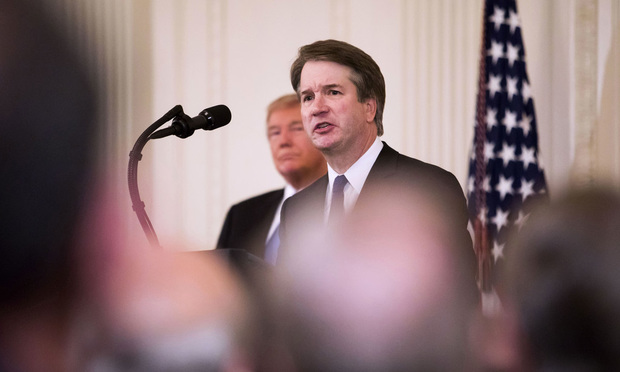 Consumer Financial Protection Bureau headquarters in Washington, D.C. Credit: Diego M. Radzinschi / ALM
Consumer Financial Protection Bureau headquarters in Washington, D.C. Credit: Diego M. Radzinschi / ALM
The U.S. Supreme Court, jumping into a second separation-of-powers case this term, agreed Friday to decide the constitutionality of the single-director structure of the Consumer Financial Protection Bureau, an agency long criticized by the business community and Republican leaders on Capitol Hill.
The challenge to the independent federal agency created by Congress in the 2010 Dodd-Frank Wall Street reform law was brought by California-based Seila Law, which provides legal services to consumers, including assistance with the resolution of consumer debt. Seila Law is represented by Kannon Shanmugam, a partner at Paul, Weiss, Rifkind, Wharton & Garrison.
Recommended For You
The CFPB issued a civil investigative demand seeking information and documents from the law firm in an investigation into whether it violated certain federal laws. Seila objected to the demand, claiming that the agency was unconstitutionally structured. The CFPB petitioned a federal district court for enforcement, which was granted. The U.S. Court of Appeals for the Ninth Circuit affirmed the district court's ruling that the agency's structure did not violate the separation of powers.
In his petition, Shanmugam argued that the CFPB director alone decides what rules to issue, how to enforce the law and what penalties to impose on those who violate the law.
That combination of power concentrated in a single person who can only be removed by the president for cause "raises grave constitutional concerns," Shanmugam wrote. He also told the justices that a decision upholding the CFPB structure "could provide a blueprint for Congress to reshape the executive branch in dramatic fashion."
Justice Brett Kavanaugh, who formerly sat on the U.S. Court of Appeals for the D.C. Circuit, has lambasted the single-director power scheme at the consumer bureau. In an unrelated court challenge, he called the director one of the most "powerful" leaders in all of Washington. "Indeed, other than the president, the director of the CFPB is the single most powerful official in the entire United States government, at least when measured in terms of unilateral power," Kavanaugh wrote in one case.
 Justice Brett Kavanaugh. Credit: Diego M. Radzinschi / ALM
Justice Brett Kavanaugh. Credit: Diego M. Radzinschi / ALM The U.S. Justice Department defended the consumer agency's constitutionality for years. But under the Trump administration, the government abandoned that position and argued that the agency's structure was unconstitutional. The consumer bureau itself recently switched sides, backing Seila Law's challenge.
The court added a second question for argument: If the justices strike down the CFPB's single-director structure as unlawful, can it be severed from the whole of the Dodd-Frank Act? The Justice Department has argued that the remedy in the case "is to sever the provision limiting the president's authority to remove the bureau's director." The Justice Department has urged the court to leave the remainder of the Dodd-Frank law intact.
"Absent the for-cause removal provision, the Dodd-Frank Act and its bureau-related provisions will remain 'fully operative,'" the Justice Department said in its filing at the high court.
Lawyers for the U.S. House of Representatives, lining up against the Trump administration's Justice Department, have urged the high court to uphold the Ninth Circuit ruling. The Supreme Court is expected to appoint a friend-of-the-court to argue in defense of the Ninth Circuit's decision.
Two other petitions attacking single-director agency structures were filed in recent weeks: Collins v. Mnuchin and All-American Check Cashing v. CFPB. An appellate team at Gibson, Dunn & Crutcher, including former U.S. Solicitor General Theodore Olson and Helgi ,Walker a leader of the firm's regulatory group, argued earlier that the court should have granted its challenge to the CFPB.
The other case this term raising separation-of-power concerns involves the appointment of members to the Financial Oversight and Management Board for Puerto Rico v. Aurelius Investment. The board and the Trump administration argued that the First Circuit erred in deciding that the appointment of the board's members violated the Constitution's appointments clause. That case was argued Oct. 15.
© 2025 ALM Global, LLC, All Rights Reserved. Request academic re-use from www.copyright.com. All other uses, submit a request to [email protected]. For more information visit Asset & Logo Licensing.







